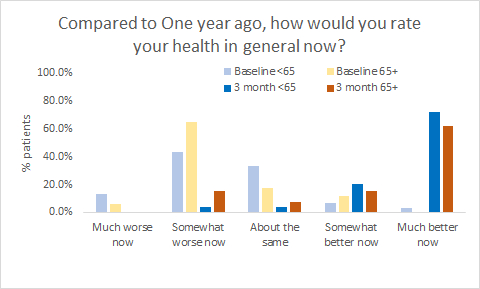QUALITY-OF-LIFE COMPARISON AFTER ELECTIVE COLECTOMY FOR DIVERTICULITIS BETWEEN PATIENTS OLDER AND YOUNGER THAN 65 YEARS: A PILOT FEASIBILITY STUDY IN MHEALTH USE
Numa Perez*, Hiroko Kunitake, David L. Berger, Rocco Ricciardi, Liliana Bordeianou, Christy E. Cauley
Surgery, Massachusetts General Hospital Department of Surgery, Boston, MA
Introduction: Sigmoid diverticulitis significantly affects quality of life (QOL) due to recurrent and intractable pain, infectious complications, and obstructive symptoms. Recent randomized clinical trial evidence supports elective laparoscopic colon resection over medical therapy in patients under 75 years. However, QOL outcomes among older adults undergoing elective surgery for diverticulitis is poorly described. The aims of this study were to 1) determine the feasibility of using a mobile healthcare (mHealth) based platform to evaluate QOL outcomes in patients 65 years or older and 2) compare quality of life outcomes between these patients and their younger counterparts. We hypothesized that patients ?65 years will have high completion of mHealth questionaries and similar overall QOL improvement 3 months after elective surgery.
Methods: Adult patients who underwent elective colectomy for diverticulitis between June 1, 2020 and August 31, 2021 were included. Patients were automatically enrolled in the mHealth platform with minimal staff assistance and responded to automated QOL questionnaires sent at two timepoints: 0-14 days prior to surgery and 3 months following surgery. Response rates and exploratory evaluation of overall health related QOL between patients older and younger than 65 years are reported.
Results: Sixty-two patients (37.1% male) underwent colon resection for diverticulitis over the study period, with a median age of 60 years (IQR 54-68). Twenty-two patients (35.5%) were 65 years or older. Overall response rates for the QOL survey were 75.8% preoperatively and 61.3% on 3-month postoperative follow-up. Baseline and 3-month response rates were the same despite age group (p=0.84 at baseline and p=0.79 at 3 months). When asked, "Compared to one year ago, how would you rate your health in general now?" a single patient (2.13%) selected, "much better now than one year ago" prior to surgery. Conversely, 3 months after undergoing surgery, 26 patients (68.4%) indicated their overall health was much better than one year prior, a significant improvement in QOL. These findings were similar across age groups (see Figure).
Conclusion: Using an mHealth platform to evaluate health related QOL outcomes is feasible in patients 65 years and older undergoing elective surgery for diverticulitis. In addition, this exploratory analysis of QOL benefits of elective surgery for diverticulitis revealed similar outcomes across age groups.
Back to 2022 Abstracts
